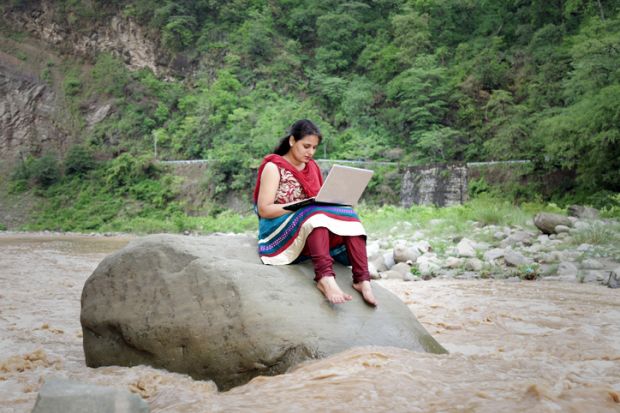Indian students have voiced deepening frustration over continuing online education, with learners at the prestigious University of Delhi (DU) complaining of poor attendance in online classes and cheating in examinations.
Undergraduates questioned why Delhi – one of the most historic higher education institutions in India – had not returned to face-to-face teaching even though the majority of students were fully vaccinated and wanted to resume in-person learning.
“We are not getting what we expect from such prestigious colleges,” said Karanjeet Kekawariya, a first-year mathematics student at the University of Delhi, who added that it was “high time” that administrators paid “serious” attention to students’ complaints.
Like other students who spoke to Times Higher Education, he was disillusioned with the university, bemoaning the fact that learning had been entirely online since he began his studies.
“This online education is nothing but just a formality,” said Dipankat Rawat, a second-year student at the university. In his class of more than 60 students, only 15 to 20 regularly attended online courses, he claimed. The “rest of them didn’t even know what subjects we are studying, but they are getting passed”, he said.
Students said there was little incentive to participate because attendance is not monitored.
Divya Bhatia, a second-year student taking English, said some of her peers did not even bother to fill out open book examinations, which are handwritten. Some even went so far as to solicit shopkeepers to fill out the answer sheets, she said, adding that “students have literally named it ‘FHT’, fast handwriting test”.
Both Mr Rawat and Ms Bhatia said they would have chosen another university had they known they would still be in online classes two years later.
“I took admission in DU because of the prestigious portrait of its reputation and the low fees,” said Ms Bhatia, adding that while some students might wish to switch university, they might lack the means to do so.
But administrators speaking to THE were sympathetic to the university. Mousumi Mukherjee, deputy director of the International Institute for Higher Education at O.P. Jindal Global University, said Delhi was far from alone in experiencing difficulties.
“The problem with online teaching in public institutions like DU is that most faculty are not trained in digital pedagogies,” she said. “The rigour that is there with respect to course design, pedagogy and assessment…is not there in the way course content is being delivered virtually.”
She suggested that institutions would do better to turn to “established commercial digital learning platforms” that specialised in online learning.
Another administrator at a leading Indian institution who did not wish to publicly comment on DU’s situation expressed sympathy with its predicament, which comes just months after a severe second wave of Covid-19 crippled the country’s hospitals and as new infections are once more spiking.
“I am sure no institution is enjoying this,” the administrator said. “They are doing what they have to do because of the raging pandemic.”
But even if quality issues can be addressed, India still has a long way to surmount access issues, students said. They noted that internet costs – which have risen recently – have compounded an already stark digital divide.
“Many students live in rural and remote areas of India, and they [do] not even have good internet facilities – forget about wi-fi,” said Mr Rawat. “Only those who can afford online education can take it; [the] rest will be passed without learning anything.”
The University of Delhi did not respond to THE’s request for comment.




